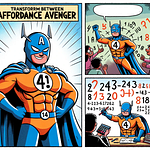Sorry about the delay in sending this out.
Humans are social creatures and we spend much of our lives perceiving, assessing and judging others. For example, most of us can easily recognize faces. But, surprisingly, some people struggle with it. These individuals are termed "Prosopagnosics" or "face blind." It's more common than we thought; about 1 in 50 people have this difficulty. On the other hand, some are exceptional at recognizing faces and are termed "super recognizers".
Computers are also getting good at this through deep learning networks. These systems can identify people's features, like age, gender, and race. They can even make educated guesses about someone's wealth or emotional state. This information can be valuable. For instance, a store like Neiman Marcus might want to know if a customer walking in is likely to make a purchase and how much they might spend.
But what if we can't see someone's face? Like in a video call where the quality isn't great, or for our listeners who can't see us at all? Well, voice can provide clues, too; we can judge someone's trustworthiness from how they sound. Is the person trustworthy? That's one big question. There are two ways to look at it: their general trustworthiness and whether they're being truthful in the current moment. Automated lie detection, like polygraphs, has been pursued for a long time. Recent technology suggests machines might sometimes be better at detecting lies than humans.
How about using AI in remote interviews, like on Zoom? After COVID, I've mostly done remote interviews. I've always felt that people were honest, but AI could help judge someone's skills or personality in other situations. It's worth considering when we might want AI's help to judge trustworthiness or skills.
In the future, artificial intelligence (AI) tools will play a crucial role in various aspects of our lives, including dating and personal interactions. AI can help determine another person's trustworthiness and intentions. Some dating apps have already used AI for matchmaking, but it could be refined further to help with specific dating goals. Additionally, AI could benefit individuals with challenges like face recognition disabilities or autism by assisting them in understanding others' intentions. Just like a king's advisor would provide information about someone, AI could serve as a guide, offering insights about the people we meet. While traditionally, we discover mutual interests through conversation, AI might soon provide that information automatically, making interactions more informed.
AI tools are becoming more integrated into our daily lives, raising concerns about privacy. While these tools can provide valuable insights and data in real-time, they also have the potential to reveal personal information about individuals. This brings up ethical questions about our right to privacy. For instance, when we step outside our home, should we expect to remain anonymous or is it acceptable for AI to recognize and share details about us? Interestingly, privacy expectations differ based on where you live. In cities, people often expect anonymity, while in small towns, personal details are widely known. As technology evolves, urban life might begin to resemble small-town dynamics, where everyone knows about each other. This shift could be unsettling for many who value their privacy.
As technology continues to advance at a rapid pace, society faces a crossroads in determining how we value and protect individual privacy. The convergence of urban anonymity with small-town familiarity, facilitated by AI, may challenge our traditional understanding of private and public spaces. While some might find comfort in a more interconnected community, others fear the loss of personal boundaries and the potential misuse of their data. Moreover, there's a need to address the generational differences in privacy expectations, as younger generations, raised in the digital age, might have a different perspective than older ones. Establishing clear guidelines and ethical standards for AI use will be essential. Balancing technological advancements with personal rights will require open dialogue, adaptable policies, and a commitment to prioritizing individual well-being in the digital era.
In a hypothetical AI-enabled culture, we often already know a lot about anyone we are about to meet due to accessible information. This means that when we meet, the actual physical interaction, like a handshake, might become more significant than exchanging basic details about each other. This concept could be especially true in dating situations, where personal connections matter more than in professional settings like job interviews. As AI continues to evolve, it's not just about the technology but the social implications it brings. While we can anticipate certain technical changes, predicting the social impacts is more challenging. As AI changes our way of life, new social norms will emerge, replacing the old ones. The influence of AI on our culture will be vast, and it's essential to keep discussing its implications.















